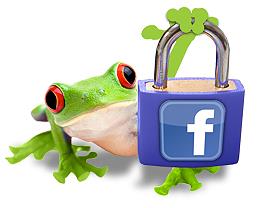JUNE 2012: Why were people hopping with anticipation over Facebook going public? It has more than 900 million users! All those users sharing what they “like” makes Facebook incredibly attractive to advertisers and web developers.
And to cyber criminals!
Cyber criminals see Facebook as the world’s largest pond of deliciously vulnerable prey. Malware written specifically for Facebook is growing in leaps and bounds, right along with all those apps and games.
Here’s how to protect your computer from malicious Facebook posts, links, apps and more:
First, get the free anti-virus software available on Facebook’s Anti-Virus Marketplace. Facebook has partnered five top security developers to offer anti-virus software at no charge for six months. The applications are the same ones you’d get from the developers directly and they protect your computer from malware, viruses or other nasty code (listen up, Mac users — you’re no longer immune).
Choose from Microsoft Security Essentials, Norton AntiVirus, McAfee Internet Security, Trend Micro internet security for PCs and Macs, and Sophos Anti-Virus for Mac Home Edition. Facebook has participated in at least one joint promotion before (with McAfee in 2010).
The goal is to reduce malware on Facebook and build a url blacklist to sites and pages so they can’t bother you again.
2. Update your Security features. These are different from your Privacy features. To set your security features, go to the little arrow on the far right end of the Facebook toolbar and choose Account Settings from the pull down menu. Then choose Security Settings from the menu on the left. Set each selection to the strictest option available and make sure you delete any Active Sessions you don’t recognize (found at the bottom of the menu).
3. Remove extra apps. On the same Account Settings page, go to your Apps Settings from the menu on the left and review all the apps you’ve allowed to interact with your Facebook account. Edit or remove permissions for apps you don’t use often or at all because they can snatch up private information. The fewer apps that have permissions, the better.
4. Accept Facebook’s help. Go to the Facebook Security page and Like it to get updates in your News Feed. Also check out the Facebook Security Tips page and, if you care about kids who use Facebook, check out the tools for parents, teachers, teens and law enforcement on the Facebook Family Safety Center page.
5. Understand how Facebook uses data. When you know how the information you share is used, you can make better decisions. Check out Facebook’s explanation of its own privacy policies, including “Information we receive about you and how it is used,” “Sharing with other websites and applications” and “How advertising works.”
If you’d like to review everything you have on your Facebook page, you can now also download all your content.

